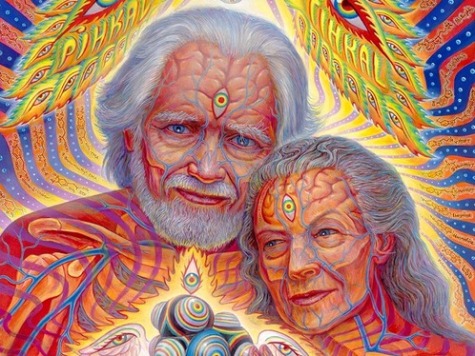
Alexander Shulgin, pioneering psychedelic pharmacologist, has died – and those of us who were there at the birth of rave salute him.
Shulgin did not invent MDMA – aka Ecstasy – which was first created by the Swiss pharmaceuticals firm Merck in 1912. But he did introduce it to the broader culture, first by recommending it to psychologists in the late 1970s, who used it as an aid to talking therapy. From here the “love drug” leapfrogged from the clubs of Chicago, New York, and Detroit – then across to London via Ibiza – where it helped pioneer a new genre Acid House and went on to warp the minds of an entire generation, mostly, I think for the better.
But then I would say that because I was one of those early rave kids, queuing up outside “Love” at the Wag in my red bandana, smiley t-shirt and white bicycle shorts with the Madonna on them. For a full description of what went on in those days, you’ll have to try and procure a copy of my masterpiece Thinly Disguised Autobiography. Suffice to say that I spent a fair chunk of the late Eighties dancing spastically while buzzing off my tits and I have absolutely no regrets at having done so.
Possibly it did blow my mind but not to such an extent that I’m incapable of stringing a sentence together. And in any case, my experience is that the irreparable damage MDMA undoubtedly does to the brain is largely beneficial. What it does – apparently by stimulating the same part of the brain which, in experiments on rats triggers repetitive behaviour – is create a lifelong addiction to rhythmic beats. Dance music often makes little sense to people have never done E. Afterwards – and during, of course – it makes total sense.
Though Shulgin believed that drugs should be legal, he had mixed feelings about the rave culture he unwittingly spawned. “Go banging about with a psychedelic drug for a Saturday night turn-on and you can get into a really bad place, psychologically,” he wrote in his book Phenethylamines I Have Known And Loved. He was, after all, a serious research scientist, who first made his name synthesising pesticides for Dow Chemical in the late 50s. One of his discoveries, a biodegradable pesticide called Zectran made Dow so much money that Shulgin was given free rein to pursue his own interests in the lab.
Inspired by a happy experience with mescaline – a peyote derivative – in the Fifties, Shulgin decided to focus on psychedelics. He came across MDMA in 1965 but didn’t try it himself till much later, an experience he described in his journals.
“I feel absolutely clean inside, and there is nothing but pure euphoria,” wrote Shulgin in his journals. “The cleanliness, clarity, and marvellous feeling of solid inner strength continued through the next day. I am overcome by the profundity of the experience.”
Subsequently he went freelance, creating more than 200 psychoactive compounds in his San Francisco home laboratory which he tested on himself and his wife Ann. Initially he did this legally, under a licence from the Drug Enforcement Agency which was later withdrawn.
But Shulgin had the last laugh on the anti-drugs establishment by dying at the ripe old age, his faculties fully intact, after a lifetime’s experimentation in which he had taken more then 4,000 trips.

COMMENTS
Please let us know if you're having issues with commenting.